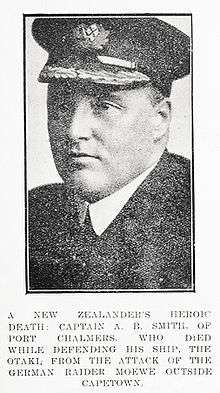Archibald Bisset Smith
| Archibald Bisset Smith | |
|---|---|
 Auckland Weekly News Portrait published on 12 April 1917 | |
| Born |
December 19, 1878 Cults, Aberdeenshire |
| Died |
March 10, 1917 (aged 38) Atlantic |
| Allegiance |
|
| Service/ |
|
| Rank | Master (Lieutenant) |
| Unit | Royal Naval Reserve |
| Commands held | SS Otaki |
| Battles/wars | World War I |
| Awards | Victoria Cross |
Archibald Bisset Smith VC (19 December 1878 – 10 March 1917) was a Scottish recipient of the Victoria Cross, the highest and most prestigious award for gallantry in the face of the enemy that can be awarded to British and Commonwealth forces.
World War I action and Victoria Cross
Smith received this award for his action as Master of the SS Otaki, a ship of the Mercantile Marine. On 10 March 1917 in the Atlantic, the SS Otaki, whose armament consisted of one 4.7-inch gun, sighted the German raider SMS Möwe, which was armed with four 5.9-inch, one 4.1-inch and two 22-pounder guns. The raider called on Otaki to stop, but Captain Smith refused to do so. A duel ensued, during which Otaki secured a number of hits and caused considerable damage, but she herself sustained much damage and was on fire. Captain Smith, therefore, ordered his crew to abandon ship, but he himself stayed on board and went down with his ship.
His citation reads:
For most conspicuous gallantry and devotion to duty when in command of the S.S. "Otaki", on the 10th March 1917. "At about 2.30 p.m. on 10th March 1917, the S.S."Otaki", whose armament consisted of one 4.7 in. gun for defensive purposes sighted the disguised German raider "Möwe", which was armed with four 5.9 in., one 4.1 in. and two 22 pdr. guns, and two torpedo tubes. The "Möwe" kept the "Otaki" under observation for some time and finally called upon her to stop. This Lieutenant Smith refused to do, and a duel ensued at ranges of 1,900 - 2,000 yards and lasted for about 20 minutes. During this action the "Otaki" scored several hits on the "Möwe", causing considerable damage, and starting a fire which lasted for three days. She sustained several casualties and received much damage herself, and was heavily on fire. Lieutenant Smith, therefore, gave orders for the boats to be lowered to allow the crew to be rescued. He remained on the ship himself and went down with her when she sank with the British colours still flying, after what was described in an enemy account as "a duel as gallant as naval history can relate."[1]
As a Merchant seaman, he could not receive the VC at that time. In 1919 he was posthumously promoted a temporary lieutenant in the Royal Naval Reserve and was then entitled to receive the VC posthumously.
As a British Merchant seaman who has no known grave, he is commemorated on the Tower Hill Memorial.[2] On 10 March 2017, a memorial stone was laid at Schoolhill, Aberdeen, to commemorate the centenary of the award of the VC.
His VC is preserved at the P&O Heritage Collection in London.[3]
Personal life
Smith was born at Cosie Brae in Cults on 19 December 1878, one of five children of William Smith, an accountant and wholesale merchant, and Annie Smith (née Nicol), both originally from Rhynie. William Smith was a descendant of Bold Peter Smith, a Jacobite killed at the Battle of Culloden.[4]
Archibald was a student at Robert Gordon's College before joining the Merchant Navy in 1895. He gained, gaining his Master's ticket in 1903 while serving with the New Zealand Shipping Company, and served on the steamers Waikato, Rakaia, Waimate and Turakina.[4]
Shortly before World War I, Smith married Welsh-born Edith Clulee (née Powell), whom he had met while working in Port Chalmers, New Zealand. She had a son, Alfred, from a previous marriage. Alfred later took his stepfather's surname.[4]
Legacy
Edith and Alfred received the posthumous VC from King George V in 1919. After Edith's death in 1951, Alfred sold the VC and Archibald's other medals (the British War Medal, Victory Medal, and Mercantile Marine Medal) to the New Zealand Shipping Company for £ 125.[5]
In 1937, his family presented the Otaki Shield to Robert Gordon's College, to be an annual award to the senior boy who is judged "pre‐eminent in character, in leadership and in athletics". The shield is accompanied by the prize of six weeks in New Zealand as Otaki Scholar, visiting various schools as a "roving ambassador" for the college.[4][5]
Bibliography
Notes
- ↑ "No. 31354". The London Gazette (Supplement). 23 May 1919. p. 6446.
- ↑ Smith, Archibald Bisset
- ↑ Stewart 2017
- 1 2 3 4 "Archibald Bisset Smith VC," Robert Gordon's College website. Retrieved 28 July 2018.
- 1 2 McEwen, Alistair (2014). "Scottish Victoria Cross awards," Scotland's War. Retrieved 28 July 2018.
References
- Monuments to Courage (David Harvey, 1999)
- The Register of the Victoria Cross (This England, 1997)
- Scotland's Forgotten Valour (Graham Ross, 1995)
- VCs of the First World War - The Naval VCs (Stephen Snelling, 2002)
- Stewart, Iain (3 March 2017). "Holders of the Victoria Cross Buried at Sea or Lost at Sea". victoriacross.org.uk. Retrieved March 10, 2017.
External links
- "Archibald Bisset Smith". Find a Grave. Retrieved 9 August 2010.
- CWGC entry